Director Lee Unkrich On How Pixar's 'Coco' Came To Life [Interview]
Pixar's latest film Coco hits theaters this week and I sat down with director Lee Unkrich (Toy Story 3), producer Darla K. Anderson and writer/co-director Adrian Molina to talk about how the story came about. Along the way, we touch on the abandoned film project that Lee was working on with screenwriter Michael Arndt, how The Book Of Life affected this production, the evolution of the idea from the initial spark to the finished film, how Adrian Molina got involved in the project, how Lee Unkrich went from editor to director and how he edits his own films, how Darla got a credit as "Digital Angel" on the original Toy Story, hiding easter eggs in an international setting, and working with Michael Giacchino.
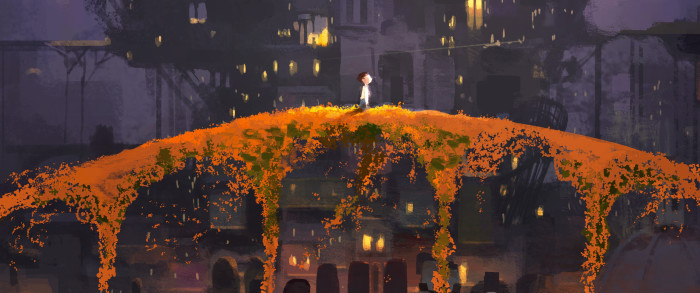 Peter Sciretta: Okay, so you were directing Toy Story 3 and...Anderson: Wayback Time Machine.Peter: I'm assuming this idea came about while you were finishing that movie. Unkrich: Well it didn't come out up till after we finished Toy Story 3. Yeah, I wasn't thinking about it earlier. We just kind of, we got Toy Story 3 out into the world and then started thinking about what might be next. And I had a few different ideas. I had an idea that I developed with Michael Arndt back before we did Toy Story 3 that I had on the table. And...Peter: And that's not happening anymore?Unkrich: No. That'll probably never happen now.Anderson: Ever, ever.Unkrich: Probably not.
Peter Sciretta: Okay, so you were directing Toy Story 3 and...Anderson: Wayback Time Machine.Peter: I'm assuming this idea came about while you were finishing that movie. Unkrich: Well it didn't come out up till after we finished Toy Story 3. Yeah, I wasn't thinking about it earlier. We just kind of, we got Toy Story 3 out into the world and then started thinking about what might be next. And I had a few different ideas. I had an idea that I developed with Michael Arndt back before we did Toy Story 3 that I had on the table. And...Peter: And that's not happening anymore?Unkrich: No. That'll probably never happen now.Anderson: Ever, ever.Unkrich: Probably not.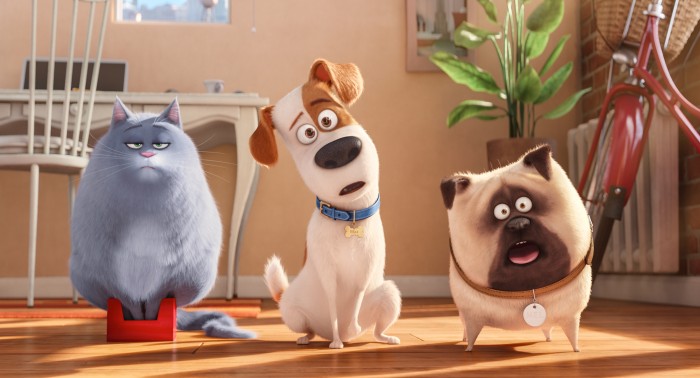 Peter: Well what was it?Unkrich: It was an idea that ended up inadvertently sharing a lot of elements of The Secret Life of Pets. So that's why I say it probably will never happen now.Peter: Makes sense.Unkrich: It wasn't the same story, but there were a lot of things similar about it. Anyway, but then I had this idea of telling a story set against Dia de Muertos, which I'd always been interested in. And at the time, there, when I looked back at the entire, you know, 100-plus year history of cinema there was almost nothing having to do with Dia de Muertos that had ever been explored. And so it seemed to me to be a really unique, original idea to pursue. And most importantly it just seemed like there was the potential for doing something visually really dazzling but also something that can have a really strong emotional core. We're always looking for that with anything, any story that we start pursuing.
Peter: Well what was it?Unkrich: It was an idea that ended up inadvertently sharing a lot of elements of The Secret Life of Pets. So that's why I say it probably will never happen now.Peter: Makes sense.Unkrich: It wasn't the same story, but there were a lot of things similar about it. Anyway, but then I had this idea of telling a story set against Dia de Muertos, which I'd always been interested in. And at the time, there, when I looked back at the entire, you know, 100-plus year history of cinema there was almost nothing having to do with Dia de Muertos that had ever been explored. And so it seemed to me to be a really unique, original idea to pursue. And most importantly it just seemed like there was the potential for doing something visually really dazzling but also something that can have a really strong emotional core. We're always looking for that with anything, any story that we start pursuing.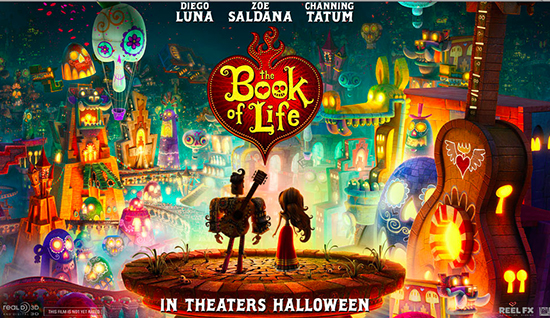 Peter: Yeah. And how long were you working on this before Book of Life became news?Anderson: Book of...? I'm just kidding.Unkrich: I don't know, maybe a year or so into developing it, yeah.Anderson: Easily.Peter: So did you guys have to rework the initial idea because of that film?Unkrich: We didn't. It did give me pause. I'd be lying if I didn't say I was disheartened at the news. Just because I knew that it would render what we were doing less original automatically. And that we would be potentially, there would be finger pointing about ideas being stolen and this and that. And but at the end of the day, we felt like we had a really solid story that we were pursuing. And so we just, we went for it. And I was nervous until the Book of Life came out, because we didn't know what it was about. We didn't know exactly what the storyline was. So when we finally saw it, I was very relieved that even there were a few, little, minor similarities that by and large we were telling a very different story. And so we subsequently got to know Jorge and we've all gotten to be friends. We were supportive of his film. He's been super supportive of ours. He came to the premiere last night.Peter: That's cool.Unkrich: And Guillermo Del Toro's been really supportive as well. So we just, we feel like there's obviously more than one story that can be told in this world. Just like you can have lots of Christmas movies.Peter: For sure. But I feel like there have been 100 years of no movies about it and if I was working on this idea, I feel like my heart would have been–Unkrich: Tell it to the people who made two asteroid movies in one year. Sometimes things are just in the air. And, I mean, I know Jorge had been dreaming of making that film for a very long time. I wasn't aware of it. But whatever. It's, it is what it is and now people have two wonderful films set in the world of Mexico.Peter: I mean, there's not enough. Look at all the Christmas movies.Unkrich: Yeah, there should be more. Exactly.
Peter: Yeah. And how long were you working on this before Book of Life became news?Anderson: Book of...? I'm just kidding.Unkrich: I don't know, maybe a year or so into developing it, yeah.Anderson: Easily.Peter: So did you guys have to rework the initial idea because of that film?Unkrich: We didn't. It did give me pause. I'd be lying if I didn't say I was disheartened at the news. Just because I knew that it would render what we were doing less original automatically. And that we would be potentially, there would be finger pointing about ideas being stolen and this and that. And but at the end of the day, we felt like we had a really solid story that we were pursuing. And so we just, we went for it. And I was nervous until the Book of Life came out, because we didn't know what it was about. We didn't know exactly what the storyline was. So when we finally saw it, I was very relieved that even there were a few, little, minor similarities that by and large we were telling a very different story. And so we subsequently got to know Jorge and we've all gotten to be friends. We were supportive of his film. He's been super supportive of ours. He came to the premiere last night.Peter: That's cool.Unkrich: And Guillermo Del Toro's been really supportive as well. So we just, we feel like there's obviously more than one story that can be told in this world. Just like you can have lots of Christmas movies.Peter: For sure. But I feel like there have been 100 years of no movies about it and if I was working on this idea, I feel like my heart would have been–Unkrich: Tell it to the people who made two asteroid movies in one year. Sometimes things are just in the air. And, I mean, I know Jorge had been dreaming of making that film for a very long time. I wasn't aware of it. But whatever. It's, it is what it is and now people have two wonderful films set in the world of Mexico.Peter: I mean, there's not enough. Look at all the Christmas movies.Unkrich: Yeah, there should be more. Exactly.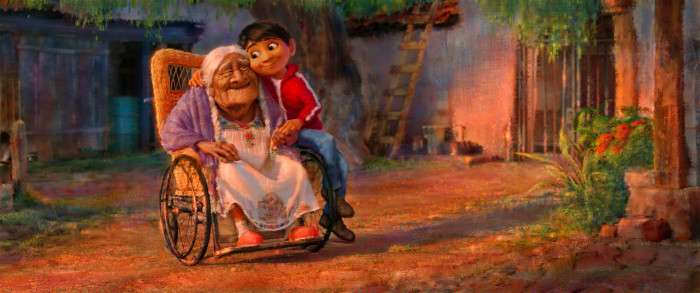 Peter: I always love the stories of the evolution of how Pixar films come about because it seems like they're always start off as something different, even though they have the core kind of ideas and they change along the way. How did this change along the way?Unkrich: Well, we didn't have like the kind of radical change that say Up had, which really started as something completely different. We always knew this was gonna be a story set against Dia de Muertos. My initial approach was to tell a story about an American kid with a Mexican mother and an American father. And a story about him going down to Mexico for Dia de Muertos to experience the holiday and it ultimately was a story about a kid dealing with grief and learning to let go of somebody he had lost who he loved. And we put a lot of work into it. We didn't, we never went up on reels with it, but we had a whole script and we had done a lot of development art. But we just kind of, we realized one day that we were telling a story that thematically was antithetical to what Dia de Muertos is all about. We were telling a story about letting go. And Dia de Muertos is about never letting go. It's about this obligation to remember our loved ones and pass their stories along. And so we kind of scraped the whole thing down one day and started over. And at that point we had spent so much time in Mexico and had been so immersed in this world that we finally felt comfortable I guess in a way that maybe we didn't at the beginning of the process to tell a story that was actually set in Mexico about a Mexican family. And that was when we came up with this whole notion of having a film that was so filled with music and kind of the bare bones of the plot that we ended up telling with this in Coco.Peter: Adrian, How did you become involved in this?Molina: I jumped onto the film probably a year and a half to two years into development. I was finishing up as a story artist on Monsters University. And then I became free. And was asked at the studio are there any projects that you're really excited about? And I said definitely. Having worked with Lee and Darla on Toy Story 3 and just the fact that it's this film about Mexican tradition, a film about family, a film about music. These are all things that are on my like bucket list of if I could work on a film I would want it to have all of these things. So I started as a story artist and just very early on this was a story that was so interesting, but also had a lot of moving parts. And had a lot of blank spots that I would take these problems home with me. And try to be as helpful as I could in finding solutions and probably a year and a half into working on it, writing script pages in order to solve problems like this idea of the final death and how do you express that? And I'm very thankful for Lee and Darla for always having the door open and wanting to solicit as many ideas as possible because that allowed me to submit these ideas and then start to develop full outlines, full script, full screenplays for the film. And the more I was in the room, the more we talked about it, the more we were on the same page about it.Unkrich: Yeah, we were all very like-minded and we really wanted Adrian to be a bigger part of it. And also will feel uncomfortable probably me talking about him right, him sitting here, but he's super talented. And we see him as being a real rising talent in the studio. And we'd love to see him directing a Pixar. And this was a great opportunity for him to step out of what he had been doing at Pixar kind of narrowly as a story artist and kind of experience the entire, everything that goes into making a film of this size.
Peter: I always love the stories of the evolution of how Pixar films come about because it seems like they're always start off as something different, even though they have the core kind of ideas and they change along the way. How did this change along the way?Unkrich: Well, we didn't have like the kind of radical change that say Up had, which really started as something completely different. We always knew this was gonna be a story set against Dia de Muertos. My initial approach was to tell a story about an American kid with a Mexican mother and an American father. And a story about him going down to Mexico for Dia de Muertos to experience the holiday and it ultimately was a story about a kid dealing with grief and learning to let go of somebody he had lost who he loved. And we put a lot of work into it. We didn't, we never went up on reels with it, but we had a whole script and we had done a lot of development art. But we just kind of, we realized one day that we were telling a story that thematically was antithetical to what Dia de Muertos is all about. We were telling a story about letting go. And Dia de Muertos is about never letting go. It's about this obligation to remember our loved ones and pass their stories along. And so we kind of scraped the whole thing down one day and started over. And at that point we had spent so much time in Mexico and had been so immersed in this world that we finally felt comfortable I guess in a way that maybe we didn't at the beginning of the process to tell a story that was actually set in Mexico about a Mexican family. And that was when we came up with this whole notion of having a film that was so filled with music and kind of the bare bones of the plot that we ended up telling with this in Coco.Peter: Adrian, How did you become involved in this?Molina: I jumped onto the film probably a year and a half to two years into development. I was finishing up as a story artist on Monsters University. And then I became free. And was asked at the studio are there any projects that you're really excited about? And I said definitely. Having worked with Lee and Darla on Toy Story 3 and just the fact that it's this film about Mexican tradition, a film about family, a film about music. These are all things that are on my like bucket list of if I could work on a film I would want it to have all of these things. So I started as a story artist and just very early on this was a story that was so interesting, but also had a lot of moving parts. And had a lot of blank spots that I would take these problems home with me. And try to be as helpful as I could in finding solutions and probably a year and a half into working on it, writing script pages in order to solve problems like this idea of the final death and how do you express that? And I'm very thankful for Lee and Darla for always having the door open and wanting to solicit as many ideas as possible because that allowed me to submit these ideas and then start to develop full outlines, full script, full screenplays for the film. And the more I was in the room, the more we talked about it, the more we were on the same page about it.Unkrich: Yeah, we were all very like-minded and we really wanted Adrian to be a bigger part of it. And also will feel uncomfortable probably me talking about him right, him sitting here, but he's super talented. And we see him as being a real rising talent in the studio. And we'd love to see him directing a Pixar. And this was a great opportunity for him to step out of what he had been doing at Pixar kind of narrowly as a story artist and kind of experience the entire, everything that goes into making a film of this size.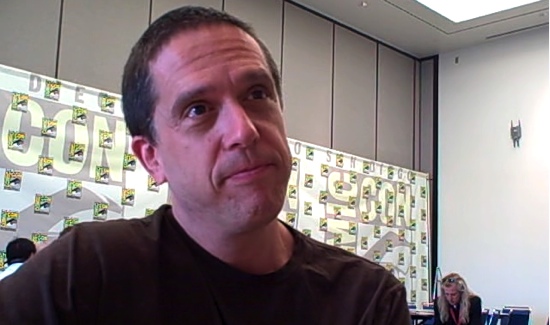 Peter: It's interesting though because I feel like usually there's a climb up like from animator. You started as an editor.Unkrich: Editor, which is real super unusual.Peter: Yeah, that's very unusual. And you actually edit your own movies as well.Unkrich: Yeah.Peter: How does that work? Because I feel like the editor sometimes can provide a different point of view on the cut, but you're so very close to this story.Unkrich: Right, yeah, perspective, yeah. Well, we still have that. I mean, we still have an editor on this show, Steve Bloom was the editor. So I do value having that distance. But at the end of the day, I mean, I'm an editor first and foremost. It's how I think, it's how I approach my the problems that I'm trying to solve. And so I can't imagine making a film where I'm not sitting alone in the cutting room just kind of steeping myself into what we're trying to do 'cause that's where a lot of my ideas come. So I've tried to partner myself with editors at the studio that are kind of on the rise. And so they can take it as an opportunity to be cutting a film, but to also learn a lot along the way.
Peter: It's interesting though because I feel like usually there's a climb up like from animator. You started as an editor.Unkrich: Editor, which is real super unusual.Peter: Yeah, that's very unusual. And you actually edit your own movies as well.Unkrich: Yeah.Peter: How does that work? Because I feel like the editor sometimes can provide a different point of view on the cut, but you're so very close to this story.Unkrich: Right, yeah, perspective, yeah. Well, we still have that. I mean, we still have an editor on this show, Steve Bloom was the editor. So I do value having that distance. But at the end of the day, I mean, I'm an editor first and foremost. It's how I think, it's how I approach my the problems that I'm trying to solve. And so I can't imagine making a film where I'm not sitting alone in the cutting room just kind of steeping myself into what we're trying to do 'cause that's where a lot of my ideas come. So I've tried to partner myself with editors at the studio that are kind of on the rise. And so they can take it as an opportunity to be cutting a film, but to also learn a lot along the way.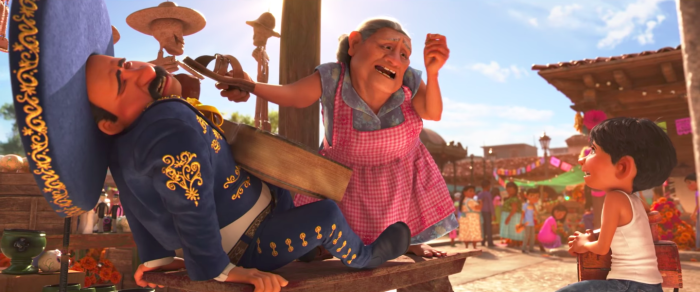 Peter: And Darla, you started at Pixar very early on, you have a title of Digital Angel on the original Toy Story. What is the story behind that? Because I don't think I've ever heard it.Anderson: I had really wanted to work at Pixar, so I knocked on the door. I had heard the rumblings of what was to become Toy Story, back in the day, ancient history. The idea that Pixar in the computer animation world, the idea that Pixar was going to attempt more than I think at the time the record was maybe five contiguous minutes of computer animation. Like nobody thought there was enough compute power on the planet to get the whole thing done. But I wanted to be part of it. And I loved Pixar's film, so I packed up my bags from San Diego and moved up to San Francisco. Knocked on the door and finally it took me about a year and a half, almost two years to get in. Finally got in and all I wanted to do was work on Toy Story. I wanted to be part of that pioneering effort. But they said, could you please start a shorts group? So I did that and we produced commercials. But then because it was the first film, everybody in that group had to help finish the film. That last summer of '95 I guess it was. Everybody in our group had to finish it.Peter: It was a rush to the finish.Anderson: Yeah. And so I went to the producers, Bonnie Arnold and Ralph Guggenheim, and I said, please can I have a credit? My whole team got the movie down. Please can I have a credit on this seminal piece of film history? And they said, you can have a credit, but you'll have to make something up. So...Peter: So you came up with Digital Angel.Anderson: I had to create my own credit. So I said, but so my nickname in San Diego from my friends was Angel of Light. So I said, how about and I worked at Angel Studios before I came to, so two different ideas. So we're Angel, so I came up with that.
Peter: And Darla, you started at Pixar very early on, you have a title of Digital Angel on the original Toy Story. What is the story behind that? Because I don't think I've ever heard it.Anderson: I had really wanted to work at Pixar, so I knocked on the door. I had heard the rumblings of what was to become Toy Story, back in the day, ancient history. The idea that Pixar in the computer animation world, the idea that Pixar was going to attempt more than I think at the time the record was maybe five contiguous minutes of computer animation. Like nobody thought there was enough compute power on the planet to get the whole thing done. But I wanted to be part of it. And I loved Pixar's film, so I packed up my bags from San Diego and moved up to San Francisco. Knocked on the door and finally it took me about a year and a half, almost two years to get in. Finally got in and all I wanted to do was work on Toy Story. I wanted to be part of that pioneering effort. But they said, could you please start a shorts group? So I did that and we produced commercials. But then because it was the first film, everybody in that group had to help finish the film. That last summer of '95 I guess it was. Everybody in our group had to finish it.Peter: It was a rush to the finish.Anderson: Yeah. And so I went to the producers, Bonnie Arnold and Ralph Guggenheim, and I said, please can I have a credit? My whole team got the movie down. Please can I have a credit on this seminal piece of film history? And they said, you can have a credit, but you'll have to make something up. So...Peter: So you came up with Digital Angel.Anderson: I had to create my own credit. So I said, but so my nickname in San Diego from my friends was Angel of Light. So I said, how about and I worked at Angel Studios before I came to, so two different ideas. So we're Angel, so I came up with that.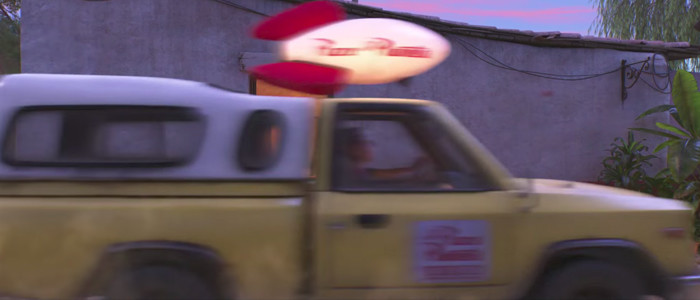 Peter: With every Pixar film there's Easter Eggs. I obviously saw the Pizza Planet truck.Unkrich: That was pretty easy.Anderson: Yeah.Peter: And Giacchino, also obvious.Unkrich: Although nobody's noticed yet is that it's actually Pizza Planet in Spanish on the side of the truck.Peter: Oh, I haven't noticed that. Unkrich: You'll have to frame through it to see that, but it's as if there's a franchise of Pizza Planet in Mexico.Anderson: You'd be the only one that knows that right now.
Peter: With every Pixar film there's Easter Eggs. I obviously saw the Pizza Planet truck.Unkrich: That was pretty easy.Anderson: Yeah.Peter: And Giacchino, also obvious.Unkrich: Although nobody's noticed yet is that it's actually Pizza Planet in Spanish on the side of the truck.Peter: Oh, I haven't noticed that. Unkrich: You'll have to frame through it to see that, but it's as if there's a franchise of Pizza Planet in Mexico.Anderson: You'd be the only one that knows that right now.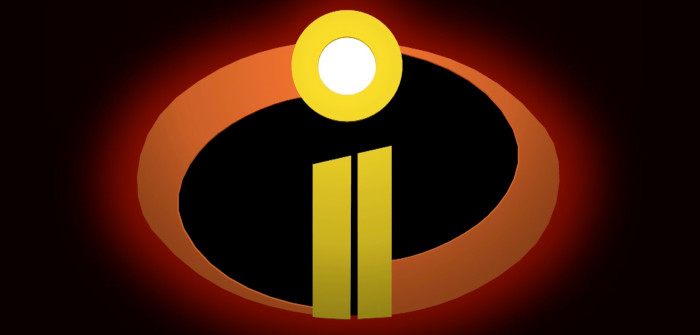 Peter: If we were looking for something from the next film, which is Incredibles 2, how/where would you theoretically fit that into a movie like Coco?Unkrich: I guess you'll have to find it.Peter: No hints?Unkrich: It's in there.Peter: At least tell us which scene?Unkrich: Mm... No, I'm not gonna give you any hints. I will say it's brief. It's a brief shot.Anderson: It's not easy.Unkrich: So you'll have to kind of know where to look to spot it. It's not obvious. But it's there. Once you see it, you'll always know it's there and you'll always see it.
Peter: If we were looking for something from the next film, which is Incredibles 2, how/where would you theoretically fit that into a movie like Coco?Unkrich: I guess you'll have to find it.Peter: No hints?Unkrich: It's in there.Peter: At least tell us which scene?Unkrich: Mm... No, I'm not gonna give you any hints. I will say it's brief. It's a brief shot.Anderson: It's not easy.Unkrich: So you'll have to kind of know where to look to spot it. It's not obvious. But it's there. Once you see it, you'll always know it's there and you'll always see it.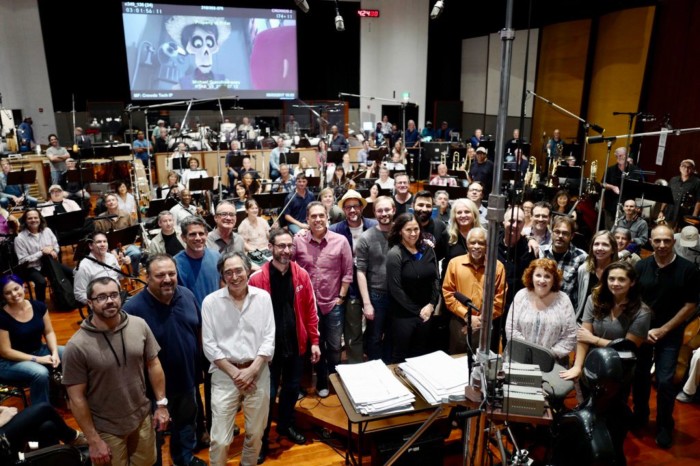 Peter: This is a musical. It's obviously set in Mexico. But you hired Michael Giacchino as a composer. And it's awesome. He makes me cry every single time. Twice last night when I saw it. But can you address the choice going Giacchino over a Mexican composer?Unkrich: Well, we actually did look at a lot of Mexican composers for a long time. 'Cause in the same way that we were, we had made this commitment to having an all Latino cast, we did look every step of the way for opportunities to have Latino artists be a part of the film. Scoring a film of this size is a very particular skill. Scoring a film of this size in a very limited amount of time, it's the animated films tend to have a large volume of music that needs to be written very quickly. And at the end of the day, we had so many moving parts on this movie and there were so many things to worry about I just really knew that we would be in good hands with Michael and that he'd be able to do what he needed to do and support the film comedically and in terms of emotion. I just knew that he would be able to do it. He also really loved what we were doing and expressed an interest in being a part of it. And was open to the idea of us kind of shoring him up with help, which we did in the form of having Germaine Franco work with him. She's a Mexican-American composer that we had done a lot of work with on the film prior to Michael coming on. And she ended up really helping him with a lot of his orchestration and arranging of the music. So it ended up being one, big, happy family. We got what Michael is able to bring in a beautiful way, but we were also able to ensure that it was culturally as authentic as an original score could be.Anderson: And Germaine and Adrian ended up writing, they ended up writing a few songs together.Molina: Original songs. Germaine's an incredible again producer, composer, orchestrator, songwriter. And so a lot of the process of the original songs writing with her it was leaning into talking about different styles of Mexican music and what would be appropriate for this moment in the film. Son jarocho, Huapango. And having her as a resource and to write the music for the lyrics of a lot of these songs really helped to create this cohesive sound between the score, between the original music and between the traditional tunes that you hear throughout the world.Unkrich: I had also really just wanted to work with Michael. 'Cause I was the only one of the old school directors at the studio who hadn't worked with him. And so I felt like I was missing out somehow so I wanted to work with him.Peter: Well it turned out pretty great.Unkrich: Yeah, he did a great job.Anderson: And he has the cameo.Peter: Yeah, the cameo, that's great. And the breaking the pencil. Thank you very much, guys.
Peter: This is a musical. It's obviously set in Mexico. But you hired Michael Giacchino as a composer. And it's awesome. He makes me cry every single time. Twice last night when I saw it. But can you address the choice going Giacchino over a Mexican composer?Unkrich: Well, we actually did look at a lot of Mexican composers for a long time. 'Cause in the same way that we were, we had made this commitment to having an all Latino cast, we did look every step of the way for opportunities to have Latino artists be a part of the film. Scoring a film of this size is a very particular skill. Scoring a film of this size in a very limited amount of time, it's the animated films tend to have a large volume of music that needs to be written very quickly. And at the end of the day, we had so many moving parts on this movie and there were so many things to worry about I just really knew that we would be in good hands with Michael and that he'd be able to do what he needed to do and support the film comedically and in terms of emotion. I just knew that he would be able to do it. He also really loved what we were doing and expressed an interest in being a part of it. And was open to the idea of us kind of shoring him up with help, which we did in the form of having Germaine Franco work with him. She's a Mexican-American composer that we had done a lot of work with on the film prior to Michael coming on. And she ended up really helping him with a lot of his orchestration and arranging of the music. So it ended up being one, big, happy family. We got what Michael is able to bring in a beautiful way, but we were also able to ensure that it was culturally as authentic as an original score could be.Anderson: And Germaine and Adrian ended up writing, they ended up writing a few songs together.Molina: Original songs. Germaine's an incredible again producer, composer, orchestrator, songwriter. And so a lot of the process of the original songs writing with her it was leaning into talking about different styles of Mexican music and what would be appropriate for this moment in the film. Son jarocho, Huapango. And having her as a resource and to write the music for the lyrics of a lot of these songs really helped to create this cohesive sound between the score, between the original music and between the traditional tunes that you hear throughout the world.Unkrich: I had also really just wanted to work with Michael. 'Cause I was the only one of the old school directors at the studio who hadn't worked with him. And so I felt like I was missing out somehow so I wanted to work with him.Peter: Well it turned out pretty great.Unkrich: Yeah, he did a great job.Anderson: And he has the cameo.Peter: Yeah, the cameo, that's great. And the breaking the pencil. Thank you very much, guys.
***
Coco is in theaters now.
